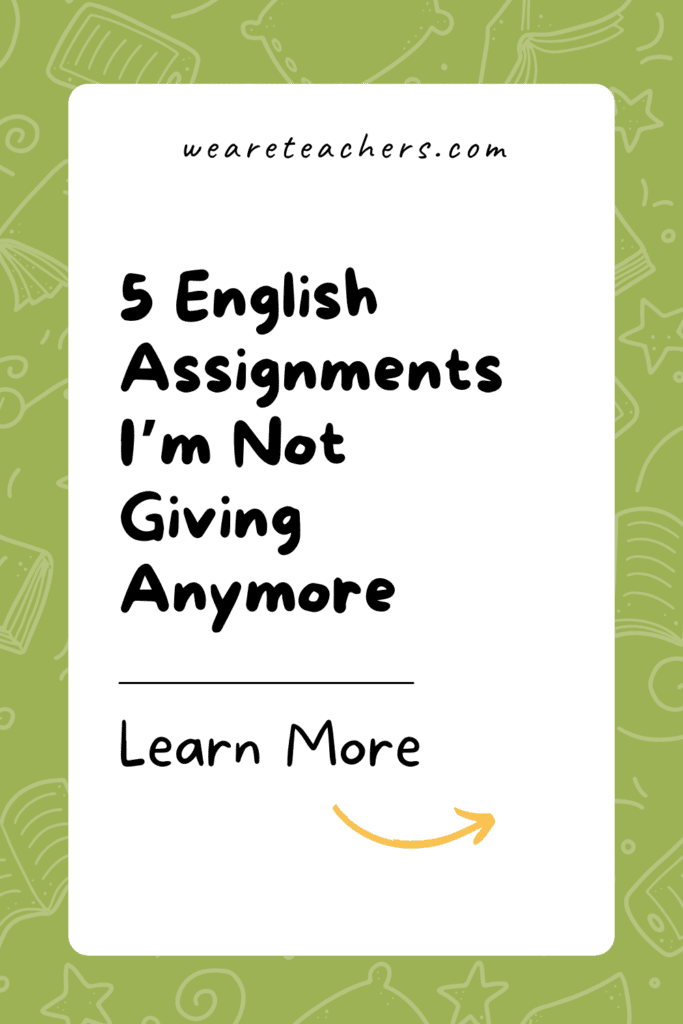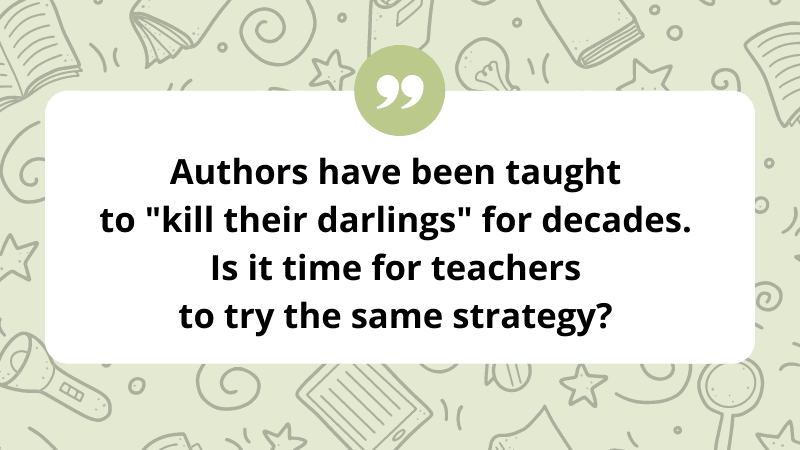Novelists are frequently encouraged to cut out anything in their writing that gets in the way of making their story as good as it can be, even if it’s something the author truly loves. The idea is known by the somewhat ominous expression: “kill your darlings.” Like writers, I think that sometimes we teachers have a hard time giving up on the English assignments we’ve used and loved for years. But just like taking a long, hard look at their writing makes an author’s final story better, tough examination of why we continue to assign certain projects will certainly improve our teaching. It might also make our classrooms more engaging, welcoming environments for our students. With that in mind, here are five English assignments I’m not doing anymore with my students.
1. English assignments involving family histories

While we’ve done a good job becoming more aware of how assignments like making a family tree can be problematic for many of our students, we need to keep going. What other common English assignments ask students to delve into their family histories? Write about the meaning or story behind your name. Describe a moment where you had to overcome adversity. Discuss a moment where your life changed forever. We need to be sensitive to how delving into the past might affect our students. There is no doubt that writing about ourselves is a powerful tool. However, we need to be careful in how asking students to think deeply about their past might affect students whose pasts contain trauma.
What to assign instead: Assignments like these can be easily adapted by offering student choice. Instead of requiring students to write about a time in their own life where they overcame adversity or learned an important life lesson (two very common choices), why not allow them to expand their options outside their own life? By asking them to write about a time when you or someone else overcame a challenge and you learned an important lesson, you give students who may not feel comfortable talking about their own past the opportunity to share how someone else’s life (real or fictional) taught them something worthwhile.
[contextly_auto_sidebar]
2. English assignments that are cute but don’t demonstrate deep learning
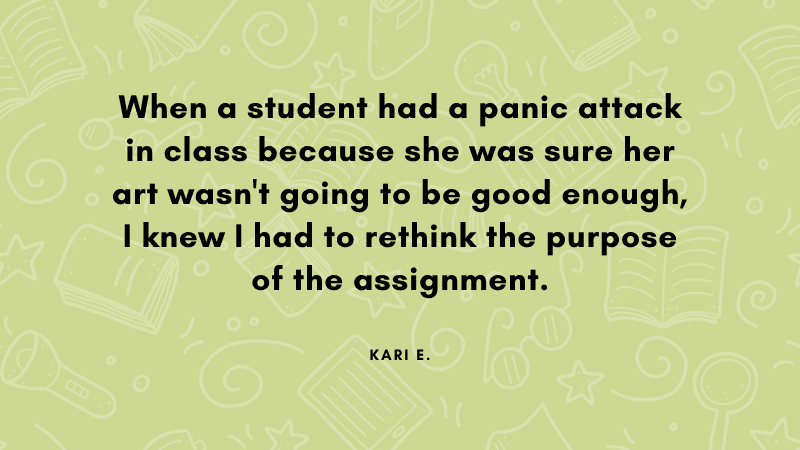
The ultimate example of these kinds of projects is the shoebox diorama, but there are many variations. In essence, they are any project where the demonstration of learning isn’t as relevant as the attractiveness of the item created. While pretty projects might make a classroom look impressive during parent-teacher conferences, often they are light on academic value. Students might love spending a week or so creating their project, but how is that relevant to their understanding of the text? Additionally, as our awareness of equity in education grows, how are assignments like this fair to students who might not have access to parental assistance or additional supplies at home? We need to stop assigning projects that put a higher value on looking good than they do on critical thinking.
What to assign instead: When creating meaningful (and fun!) final assessments, we need to start with what we want our students to truly understand about the text/unit. In what ways can they demonstrate deep understanding? Can they transfer their learning to new situations? When assignments are created with these critical thinking questions in mind, we are more likely to create final assessments that aren’t just pretty, but meaningful as well.
3. English assignments requiring public speaking

Public speaking is listed at the very top of “most hated assignment” when I polled my students each year. And I understand why. Standing up in front of your peers to deliver a speech is intimidating and often requires skills that many of us don’t consider our strongest. We assign speeches because they can be meaningful and do help students prepare to become better speakers and listeners. However, how often do adults have to stand in front of their colleagues and speak for extended periods of time? In most jobs, very little, if ever. With this in mind, I’m no longer going to require that every student demonstrates these skills in the exact same way.
What to assign instead: Speaking and listening skills are part of almost every English curriculum, but that doesn’t mean that every student has to demonstrate mastery of them in the same way. Choice can go a long way toward making an introverted student more likely to experience success. By allowing students to record their speeches, give them to a smaller group, or choose who will listen, we lessen the pressure and allow students to grow more comfortable with sharing their ideas with larger audiences.
4. English assignments that require group work
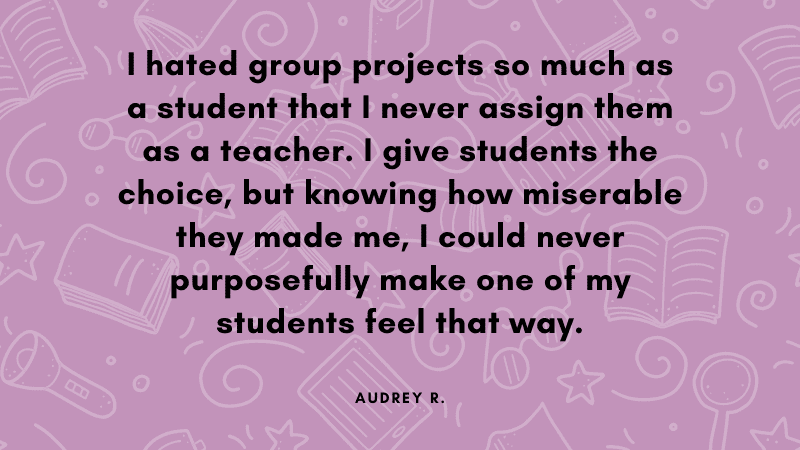
Group projects pop up almost as often as speeches when discussing hated assignments with students. Truthfully, who can blame them? We all have nightmares about being the only person who was doing the work required to complete an assignment. Or being the one student who hated speaking in front of the class so we looked bad while our teammates looked knowledgeable and prepared. Worse yet, to be graded based on how other people performed seems arbitrary and unfair. Even when I told my students I would look at their work individually, they knew part of their grade would rely upon a peer that often, they didn’t even choose to work with. We can do better.
What to assign instead: Just like public speaking, working with others is a valuable, needed skill. We don’t need to get rid of group projects altogether. Instead, we need to consider how to make them more equitable and a bit less terrifying. We can allow students choice about whether or not they want to work with a group. Or allow them to choose their group members. We can make sure to include self, group member, and full group assessment rubrics. This way, students can accurately (and privately) tell us what everyone did well (or not so well).
5. English assignments that include mandatory reading logs
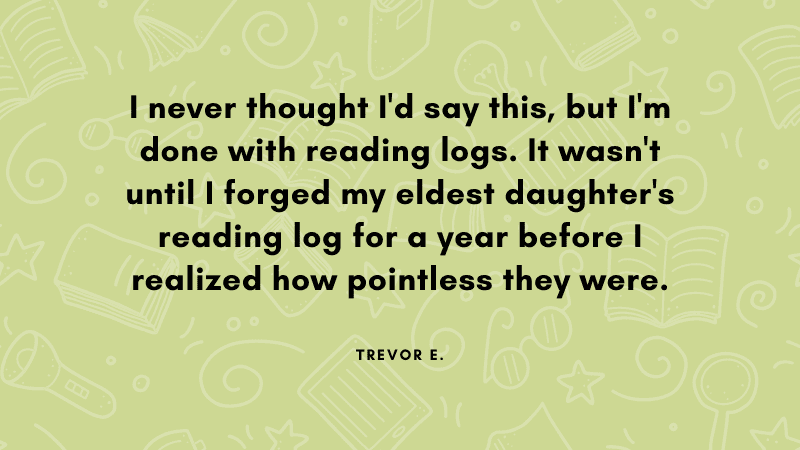
It doesn’t feel like reading logs should be a big deal, but recent studies suggest they are. The fact that students are required to read each night instead of reading for pleasure sends the message that reading is a chore rather than a joy. Additionally, requiring a signature to prove reading took place often encourages parents and students to be dishonest. They sign the log just to get it over with, and we get no useful information from it. Reading logs don’t reinforce the right things and, for that reason, I’ve stopped using them.
What to assign instead: Anything we can do to excite our students about books and get them interested in reading is a better alternative to diminishing their interest/desire to read. Book tastings, weekly read alouds, and First Chapter Fridays are just a few great ways to get a bunch of interesting books in front of our students. From there, we can encourage self-motivated reading with reading conferences. Together, we can talk about what they’re reading, how it’s going, and what they might read next. Or we can create fun reading challenges and allow students to choose ones that most motivate and excite them.
What English assignments are you done assigning to your students? Share them with us in the comments below.
Have some great alternatives to English assignments that no longer work for your students? Come and share in our WeAreTeachers HELPLINE group on Facebook.
